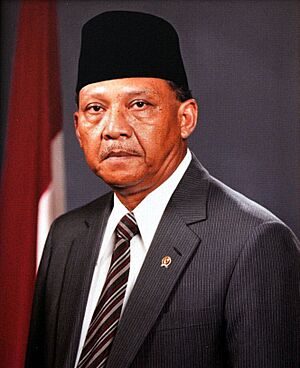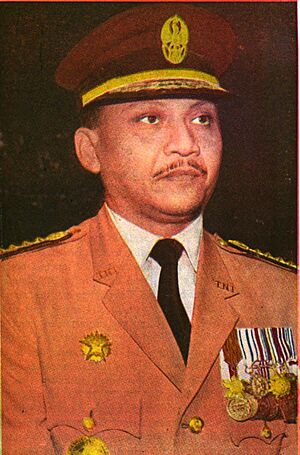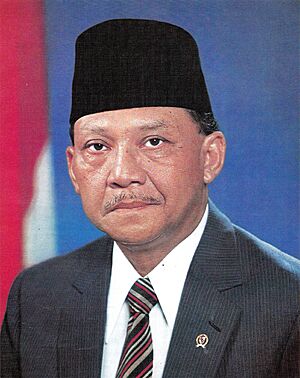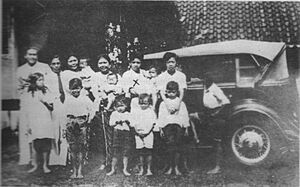Umar Wirahadikusumah facts for kids
Quick facts for kids
Umar Wirahadikusumah
|
|
|---|---|

Official portrait, 1983
|
|
| 4th Vice President of Indonesia | |
| In office 11 March 1983 – 11 March 1988 |
|
| President | Suharto |
| Preceded by | Adam Malik |
| Succeeded by | Sudharmono |
| 8th Chair of the Audit Board of Indonesia | |
| In office 1973–1983 |
|
| President | Suharto |
| Preceded by | Dadang Suprayogi |
| Succeeded by | Mohammad Jusuf |
| 9th Chief of Staff of the Indonesian Army | |
| In office 25 November 1969 – 27 April 1973 |
|
| President | Suharto |
| Preceded by | General Maraden Panggabean |
| Succeeded by | General Surono Reksodimedjo |
| 2nd Commander of Kostrad | |
| In office 2 December 1965 – 27 May 1967 |
|
| President |
|
| Preceded by | Maj. Gen. Suharto |
| Succeeded by | Maj. Gen. Kemal Idris |
| Personal details | |
| Born | 10 October 1924 Soemedang, West-Java, Dutch East Indies |
| Died | 21 March 2003 (aged 78) Jakarta, Indonesia |
| Resting place | Kalibata Heroes' Cemetery |
| Political party | Golkar |
| Spouse |
Karlinah Djaja Atmadja
(m. 1957) |
| Relations | Agus Wirahadikusumah (nephew) |
| Children | 2 daughters |
| Occupation |
|
| Military service | |
| Allegiance | Indonesia |
| Branch/service | Indonesian Army |
| Years of service | 1945–1973 |
| Rank | General |
| Unit | Infantry (Kostrad) |
| Commands |
|
| Battles/wars |
|
| Service no. | 13761 |
Umar Wirahadikusumah (born October 10, 1924 – died March 21, 2003) was an important Indonesian politician and a former army general. He served as the fourth vice president of Indonesia from 1983 to 1988. Before that, he was the head of the Audit Board of Indonesia from 1973 to 1983. He also served as the Chief of Staff of the Indonesian Army from 1969 to 1973.
Umar was born into a noble Sundanese family. He joined the military in 1943 during the Japanese occupation of Indonesia. He fought in the Indonesian National Revolution and other conflicts. He became a trusted ally of General Suharto during a difficult time in 1965. This trust helped his career grow. After his military service, he worked to ensure government money was used correctly. As Vice President, he was known for fighting against corruption. He passed away in 2003.
Contents
Early Life and Schooling
Umar Wirahadikusumah was born on October 10, 1924, in Situraja, Sumedang, West Java. His family was noble. His father, Raden Rangga Wirahadikusumah, was a local leader. His mother, Raden Ratnaringrum, was the daughter of another important official.
Umar's mother died when he was young. He and his siblings were raised by their grandmother. He went to elementary school in Cicalengka. Later, he continued his education at schools in Tasikmalaya and Pasundan.
Military Career
Joining the Army
In 1943, when Japan controlled Indonesia, Umar joined youth groups. These groups offered physical training. In 1944, he joined PETA, an Indonesian army group that helped the Japanese.
When Indonesia declared its independence, Umar joined the TKR. This was the first version of the Indonesian National Army.
After Independence
After Indonesia won its independence from the Dutch, Umar continued to serve in the Army. He spent a long time in the Kodam VI/Siliwangi (Siliwangi Division) in his home province of West Java. He rose through the ranks. He helped stop a communist uprising in 1948, known as the Madiun Affair. He also fought in the PRRI rebellion in Sumatra.
In 1959, Umar became the Commander of Kodam V/Jaya. This meant he was in charge of security in and around Jakarta.
The 30 September Movement
On October 1, 1965, six generals were kidnapped from their homes. As the Jakarta security commander, Umar checked the city's safety. When he heard about the kidnappings and saw unknown troops in Merdeka Square, he contacted Major General Suharto. Suharto was the commander of Kostrad, a special army unit. Umar asked Suharto for help.
Umar supported Suharto's decision to take control of the Army. He helped Suharto stop the attempted coup. President Sukarno called Umar to Halim Perdanakusuma Airport. Suharto worried this was a trap and refused the order for Umar to go. As Suharto regained control in Jakarta, Umar helped secure the city. He announced a curfew and monitored all newspapers.
The Indonesian Communist Party (PKI) was blamed for the events. Umar approved the formation of a group to stop the 30 September Movement. This led to a period of great violence in 1965-1966. Umar was not part of Suharto's closest group of friends. However, Suharto trusted him greatly for his help in stopping the movement. As Suharto became the President of Indonesia, Umar's career also advanced quickly. In 1965, Suharto chose Umar to replace him as Commander of Kostrad.
In 1967, Umar became Deputy Army Chief of Staff. Then, in 1969, he became the Army Chief of Staff. His active military career ended in 1973. He then became the Chairman of the State Audit Board (BPK). He held this job for 10 years. As Chairman of BPK, Umar's job was to make sure government departments used their money correctly. He found that many government departments had problems with corruption.
Vice Presidency (1983–1988)
In March 1983, Umar reached a high point in his career. President Suharto, who had been elected for his fourth term, chose Umar to be his vice president. This choice surprised many people. Umar was not as famous as the previous vice presidents. However, he had a good reputation and was widely respected.
As vice president, Umar was one of the few people in the Suharto government who actively fought corruption. He was a religious man. He hoped that religious values could encourage people to act honestly. Umar also made surprise visits to towns and villages. Sometimes he went secretly to see how government policies were affecting people. During his time as vice president, he also held prayer services at the Vice Presidential Palace.
Umar's term as vice president ended in March 1988. He was replaced by Sudharmono. Many people were sad that he did not continue for a second term. This showed how well-respected he was.
Later Life (1988–2003)
In May 1998, just before Suharto stepped down, Umar met with Suharto. He was with Sudharmono and Try Sutrisno to discuss the situation.
Umar passed away on March 21, 2003. He was 78 years old. He died due to heart and lung problems. His body was buried at the Kalibata Heroes' Cemetery in Jakarta.
Family Life
Umar married Karlinah Djaja Atmadja on February 2, 1957. They had two daughters. Umar was also the uncle of Agus Wirahadikusumah. Agus was a military officer who also became Commander of Kostrad. Umar's brother, Sadikin, was the father of Reini Wirahadikusumah. Reini became the first woman to be the rector (head) of the Bandung Institute of Technology in 2020.
Honours and Awards
Awards from Indonesia
Umar received many awards from the Indonesian government, including:
- Star of the Republic of Indonesia, 2nd Class
- Star of Mahaputera, 2nd Class
- Military Distinguished Service Star
- Guerrilla Star
- Star of Kartika Eka Paksi, 1st Class (for Army service)
- Star of Jalasena, 1st Class (for Navy service)
- Star of Bhayangkara, 1st Class (for Police service)
- Military Long Service Medal, 24 Years Service
- 1st and 2nd Independence War Medals
- Various Military Operational Service Medals
Awards from Other Countries
He also received awards from other countries:
- France: Grand Cross of the National Order of Merit
- Germany: Grand Cross of the Order of Merit of the Federal Republic of Germany
- Jordan: Grand Cordon with Brilliants of the Supreme Order of the Renaissance
- Malaysia: Honorary Commander of the Order of Loyalty to the Crown of Malaysia
- Netherlands: Knight Grand Cross of the Order of Orange-Nassau
- South Korea: First Class (Tong-il) of the Order of National Security Merit
- United States: Commander of the Legion of Merit
- Yugoslavia: Second Rank of the Order of the People's Army with Golden Star
 | Toni Morrison |
 | Barack Obama |
 | Martin Luther King Jr. |
 | Ralph Bunche |




